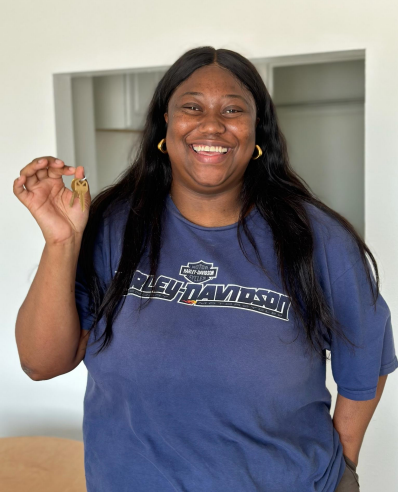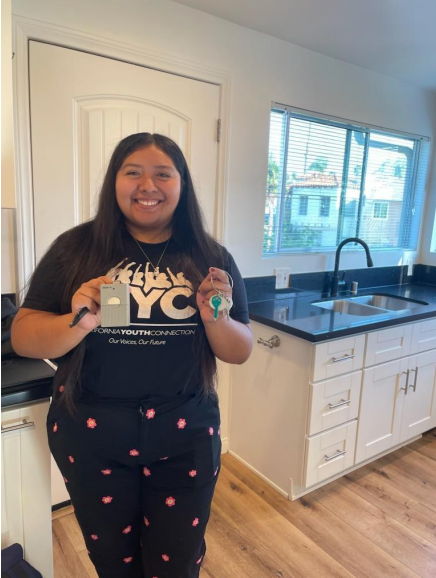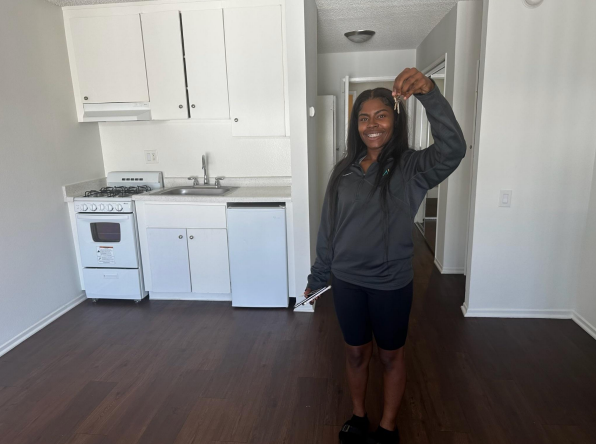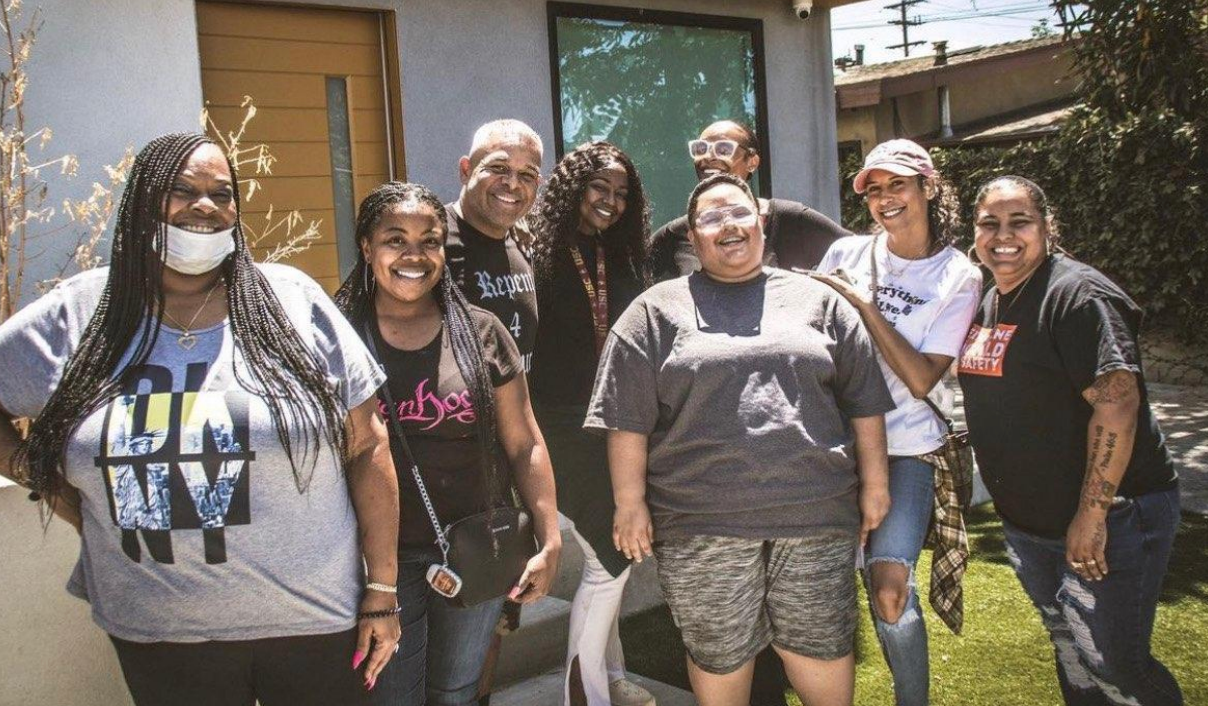LA2050 Blog
We’ve got access to the information that every Angeleno needs to make an impact. Our blog features the latest LA2050 news, announcements, features, happenings, grantee updates, and more.

The RightWay Foundation’s Operation Housing First shelters 50 youth
PostedThe RightWay Foundation’s program Operation Housing First disrupts the cycle of generational poverty and trauma for emancipated foster youth in Los Angeles County. In order to stop the foster care to homelessness pipeline, RightWay secures safely-located apartments for emancipated foster youth at risk of becoming chronically unhoused, signs the master lease, supplies the security deposit, and pays a portion of each month’s rent for one year while helping our youth build financial independence and healthy lives through our intensive programs and services.
- This year, with vital support from the Goldhirsh Foundation and the LA2050 Grants Challenge, RightWay provided comprehensive mental health, employment, and capability building services for 50 transition-age foster youth in our supportive housing program. The emancipated foster youth in RightWay’s housing have access to intensive supportive services that include:
- Empowerment/Mental Well-being Workshops (year-round): Youth learn about trauma responses, communication skills, problem-solving, self-care, and self-awareness.
- Job Readiness Training Workshops (year-round): Guides youth through the career development process and how to navigate an increasingly competitive job market.
- Financial Literacy Workshops (year-round): Youth learn about smart shopping, creating and adhering to a budget; understanding credit; and avoiding identity theft and fraud.
- One-On-One Therapy (1-2 times weekly): Individual, trauma-informed therapy that serves the specific needs of system-involved youth, increases employment retention, and improves day-to-day functioning.
- Case Management (1-3 times weekly): Connects youth to resources (e.g. housing, financial assistance, interview clothing).
- Financial Capability Services (weekly): Assistance with opening a bank account; creating and adhering to a budget; and checking credit reports.
- Supportive Services (year-round): Financial support for professional certifications, transportation assistance, haircuts and makeovers, and workplace clothing.
- One-on-One Job Coaching (as needed): Resume assistance, interview preparation, and help completing job applications.
The Goldhirsh Foundation’s grant through LA2050 directly impacted the lives of the young adults in our housing by providing funding for professional certifications to advance careers; transportation to job interviews, classes, workshops, and employment opportunities; stipends for attending RightWay’s 32-hour trauma-informed job readiness training Operation Emancipation; assistance in opening a bank account; interview clothing, work uniforms, and school supplies; baby supplies; and grocery gift cards for food-insecure youth.

With the security of stable housing and our individualized mental health and employment services, 80% of youth obtained employment/paid work experience and 76% of youth retained employment for at least 6 months. 85% of youth who meet the criteria for a DSM 5 diagnosis reported a decrease in symptoms and behaviors related to their mental health diagnosis as measured by standardized assessments.
RightWay tracks social support outcomes and access to protective factors as measures of well-being via the UCLA Loneliness Scale and Brief Universal Prevention Program Survey. At intervals throughout a youth’s participation in the program, data is collected to ensure youth are not isolated and connected to a network of support to mitigate risk factors. Participants are linked to mentors, workshop facilitators, peers, and RightWay staff who are instrumental in supporting youth and increasing access to protective factors.

Through post-assessment data collection at 3-month, 6-month, and 12-month intervals, RightWay learned that 95% reported an increase in social support and a decrease in social isolation, as measured by the UCLA Loneliness Scale and 82% reported improved mental health and emotional well-being, as measured by the Brief Universal Prevention Program Survey (BUPPS).
RightWay solicited feedback from participants through informal meetings/check-ins with our Housing Navigator and RightWay team to determine gaps in support and identify what is working well. We had great success utilizing two RightWay alumni as house managers to mediate roommate conflict, enforce house “rules,” and report successes, concerns, and questions to our Housing Navigator and RightWay team. RightWay ensured that young parents in our program had the space and support they needed to create a safe home for their children. Increasing our supportive housing for emancipated foster youth this year, RightWay grew partnerships with Butterfly’s Haven, Soledad Enrichment Action, and local property owners and management companies.

With 50 young adults in our supportive housing, we also faced challenges. We observed a surge in participants experiencing their first mental health episode, which correlates to the research that indicates these episodes occur in a person’s late teens and early twenties. Despite our comprehensive, trauma-informed approach to well-being and self-sufficiency that seeks to eliminate stressors via mental health support, life skills training, job readiness, and financial capability, the onset of mental health conditions such as schizophrenia and Bipolar Disorder for certain youth, is unavoidable. Young adults who experienced their first mental health episode while residing in RightWay housing were referred to programs focused on medication support and intensive therapy that occurs almost daily to stabilize their mental health. This challenge highlights the need for partnerships with organizations that provide short-term, bridge housing specializing in mental health stabilization.
We also noted a surge in substance use and misuse among participants and responded by hiring a full-time Substance Use Disorder (SUD) Peer Specialist. The SUD Peer Specialist engages in daily individual and group activities to promote prevention and early intervention of co-occurring disorders through a trauma-informed and harm-reduction approach. These include one-on-one support (i.e. peer counseling, emotional support), life skills training (i.e. smart shopping, budgeting, cooking,), mental well-being workshops (i.e. problem-solving, stress management, self-care, communication), SUD education (i.e. teaching youth tools to identify and minimize risks associated with substance use, helping youth make informed decisions about use), peer-led support groups, and weekly outings to build community. Our SUD peer counselor will also advocate for the development of SUD programs that are tailored to and administered by individuals with SUD and foster care experience, and will teach youth strategies to create systems change.

We are deeply thankful to the Goldhirsh Foundation and LA2050 for helping to make our programs possible. RightWay works each day to ensure foster youth in LA County have the resources, tools, and community support they need to build financial and emotional stability. No child in foster care should exit the system into homelessness. Transition-age foster youth with children should be given the housing and financial support they need to prevent their children from falling into the same destructive cycle of poverty and trauma. We see each day how in safe housing and with basic needs met, former foster youth can focus on building a stable, healthy future for themselves, their families, and their community.
As long as safe and stable housing continues to be an unmet need among current and former foster youth, The RightWay Foundation plans to sustain and expand this work by securing private and public funds. Our goal this year is to purchase an apartment complex to enable us to increase the number of emancipating foster youth safely housed across LA County.
